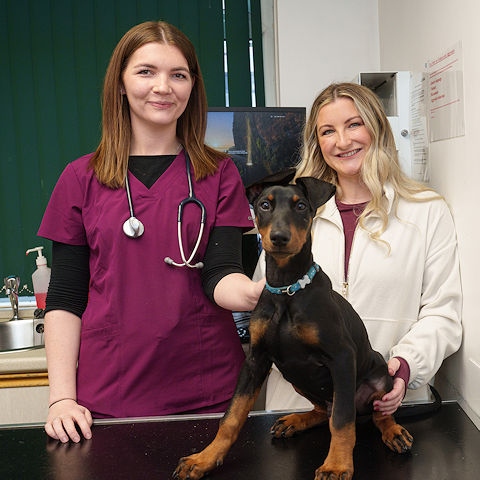Vet warns Greater Manchester pet owners after parvovirus nearly kills puppy
Date published: 29 November 2022

Hannah Darke, one of the veterinary team at Armac Vets who cared for Blue, during a follow-up check-up, with his owner Danielle Hargreaves, right.
Vets are warning Greater Manchester pet owners to get their dogs vaccinated after the deadly parvovirus nearly killed a puppy.
Blue, a young Dobermann from Rochdale, received round-the-clock care for seven days in the isolation ward at Armac Vets in Bury after testing positive for the highly infectious disease.
His condition was so critical that vets warned his owners that their beloved pup might not survive.
Armac Vets and Blue’s owners are now urging people to vaccinate their pets to prevent the spread of parvo, with puppies and unvaccinated dogs – including those that have not yet had their booster injections – most at risk.
Blue’s symptoms started with vomiting when he was ten weeks old shortly before he was due to have his second vaccination. Owner Danielle Hargreaves initially assumed he had a stomach bug but Blue’s condition worsened over the next 24 hours.
As well as being sick, he also became lethargic, lost interest in food and had diarrhoea. The following morning, Danielle saw that Blue was passing blood and she rushed him to Armac Vets’ main practice at The Rock in Bury where he tested positive for parvovirus.
Blue received 24-hour care at Armac Vets’ veterinary hospital which is equipped with the latest technology and has a veterinary team available to look after seriously-ill pets.
The day and night veterinary teams closely monitored Blue and gave him a range of treatments, including anti-sickness medicines, antibiotics, pain relief, fluids and food through feeding tubes, and blood transfusions.
Danielle said: “They couldn’t give me a prognosis. That was hard. I know with parvo they can throw all the treatment at it and some dogs survive, and some don’t. The vets were really good and gave me regular updates. I could tell they really cared and wanted to get him better.
“On the Thursday night they told me he had deteriorated a lot. They asked if I wanted them to resuscitate him if he went into cardiac arrest. That shocked me. I wasn’t allowed to see him until that night because I have another puppy at home and parvo is so infectious.
“They spoke about me seeing him to say goodbye. The following morning, he started to pick up. I don’t know whether he had heard! He was in hospital for about a week. During that time, I also had the worry about his brother, Thor, because the vet said he would already have been exposed to it. I could have lost them both. It was an emotional rollercoaster.”

Danielle does not know how Blue caught parvo. Neither puppy had been outside except in the family’s garden in Rochdale, and both had had their first vaccination, with the second due a week after Blue fell ill.
Parvo lives in the environment and is shared in dogs’ faeces. Unvaccinated dogs can spread the disease or owners can bring the virus into the home on their shoes.
Puppies are vulnerable when their mum’s protection from milk is wearing off before they are vaccinated, so they are most at risk between eight and 16 weeks.
Puppies are usually given two vaccinations, between two and four weeks apart. Armac Vets recommends a third parvo vaccine at 16 weeks, because of the number of parvo cases in the community, to give peace of mind.
With Blue back at home, Danielle is urging other owners to ensure vaccinations are up to date to prevent the spread of the disease and avoid the same heartache. Untreated puppies rarely survive.
Vet Hannah Darke who was part of the Armac Vets team that cared for Blue said: “He was really poorly. His blood pressure was up and down, and he was very sleepy. As we were rehydrating him, the parvovirus was dehydrating him at the same time. His temperature was quite low throughout his stay. His body was shutting down, so he was really critical.
“He deteriorated a lot. We did another blood test, and his protein was getting lower. We had to get in touch with the Pet Blood Bank and order two units of blood. He had multiple transfusions over the next 24 hours. This is how it is with parvo; they can start to improve and then suddenly go downhill, especially puppies.
“I don’t think the owner ever lost hope. But it took a long time. We don’t often have patients for more than two to three days. Because we are open 24 hours a day, Blue was looked after by multiple vets from the day and night team, and lots of nurses, so it was a real team effort.”
Symptoms of parvo include foul-smelling diarrhoea with blood in it, vomiting, loss of appetite and lethargy, leading to severe dehydration.
Do you have a story for us?
Let us know by emailing news@rochdaleonline.co.uk
All contact will be treated in confidence.
Most Viewed News Stories
- 1Former Nutters restaurant will be transformed into an Albert’s
- 2Police clamp down on traffic offences and uncover £25,000 cash in major operation
- 3Murder investigation after New Year's Day knife attack
- 4Snow and ice warning for Rochdale & Greater Manchester
- 5Suspected shoplifter arrested with public’s help
To contact the Rochdale Online news desk, email news@rochdaleonline.co.uk or visit our news submission page.
To get the latest news on your desktop or mobile, follow Rochdale Online on Twitter and Facebook.


